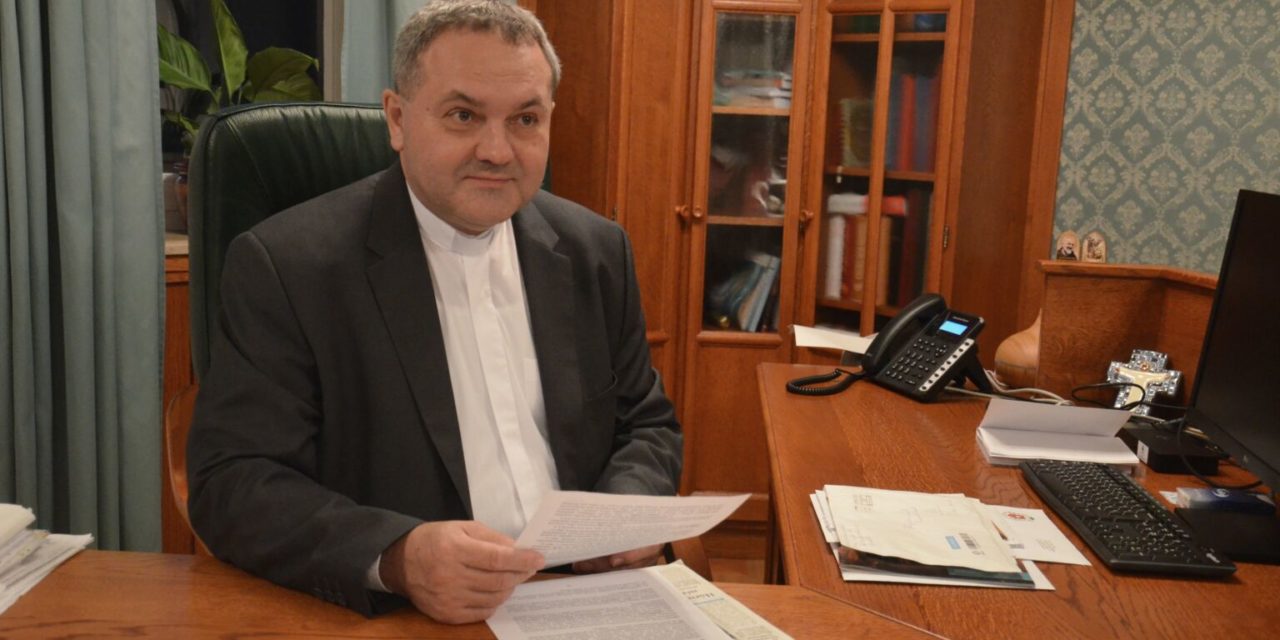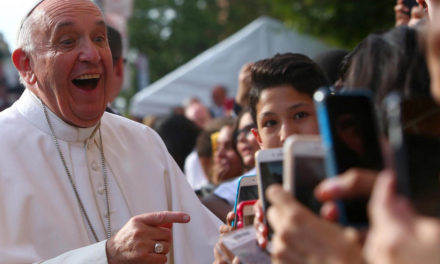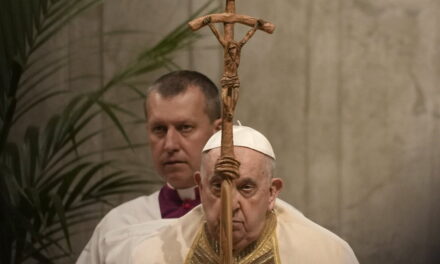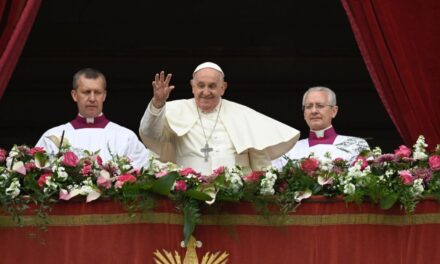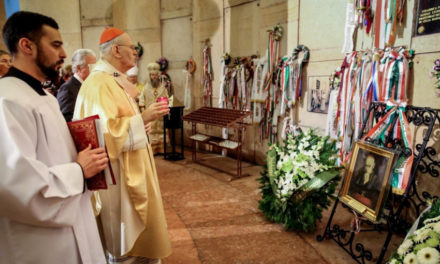László Felföldi started his episcopal service in Pécs just one year ago. He moved from the eastern part of the country, from the Diocese of Debrecen-Nyíregyházi, to the southern edge of the border, to become the chief pastor of one of our largest dioceses. In his interview on the occasion of the first Sunday of Advent, he also talked about the power of men to maintain families, the miracle of the created world and the celebration of the birth of Jesus, Christmas, the only true holiday of the Hungarian people.
- Almost to the day exactly one year ago, Pope Francis appointed him bishop of the Pécs Diocese. The faithful had already been waiting for a new head pastor for a long time, so it was particularly good that you arrived in Pécs the day after your appointment. Can we consider haste unusual?
"It was natural." On the day of my appointment, Archbishop György Udvardy, the apostolic governor at the time, indicated that he would like to convene the diocesan staff the next day and see if I could arrange for me to be there as well. It wasn't easy, I was very far from Pécs, but I knew: from that day on, I would spend my life there, and now my workplace was there. I knew that the faithful were waiting and I also thought it was important to meet to say hello. So, from then on, I came to Pécs every week. In my home at the time, I packed little by little, and here in Pécs I was unpacking the possibilities... After Christmas, I finally arrived.
- In the Diocese of Debrecen-Nyíregyházi, you were considered and loved as a highly recognized and popular pastor. Pope Francis once said: it is important for shepherds to have the "smell of the flock". Have you managed to take over the "smell of the flock" in Pécs?
"Yes, I did." I feel more and more at home, in more and more places I sense and experience that they welcome me with love and joy. They already greet you as acquaintances on the street, in the shop, well, in the parishes. And this is a very good feeling, because a person from afar is always a stranger for a while - no matter how much he doesn't feel like it. It takes countless meetings to get to know each other, but I see that my relationship with people is becoming more and more intimate and natural.
- He began his episcopal duties in a memorably difficult period: during the first wave of the coronavirus epidemic, when everyone was locked up, churches were empty, and Masses were only broadcast online. How difficult does the lack of personal presence of the faithful make the job of a newly arrived bishop?
– This period caused difficulties in the life of every person and every parish. For my part, as far as the regulations allowed, I continued what I had started. I visited the parishes, but sometimes I sat in a church alone, wearing a mask, I got to know the place, in short, I did everything I could. Today, I can meet my colleagues, priests, and the faithful again and again completely freely, uninterruptedly.
- Recently, in his speech at the installation of the Eucharistic Memorial Cross in Tamás, his love for nature was evident. Is he that close to nature, or was it just the environment and the occasion that prompted him to say what was said there?
– I grew up in unadulterated village conditions, in the wonder of the created world. Of course, this is not extraordinary: this miracle is present everywhere, whether humans are in or near nature. But as a human being, you can learn a lot from plants and animals about the order of nature.
Because nature has order and miracles, before which man can only stand with reverence and respect.
If I had the opportunity, I filled my window with flowers, and when the circumstances allowed, I planted the yard and garden of my parish full of flowers and plants.
For me, the encounter with nature is always a recharge, a rebirth - a confirmation of the reality of life. Man lives in complete symbiosis with nature. In other words, if we destroy the created world - the flora and fauna - we destroy ourselves. We cannot live without trees: what they exhale, we inhale, and what we exhale, they inhale. You can't separate the two. If I don't respect nature - even though I owe my life to her - then I don't respect myself, I don't love myself. The protection of the created world is not a mere theory or a game, but a vital human task. Just think of one tiny creature that is in enormous danger: the bee. If the bees were to die, we would have no fruits, and this would be a fatal loss to mankind. And we relentlessly destroy them with pesticides and insecticides...
- He moved from the plain region of the Alföld to the foot of the Mecsek, between hills and forests. Did you manage to get used to it?
- At first it was very strange, because everything is straight and visible in the Great Plain - and then I arrived in Pécs, where not everything is straight and not everything is visible... But I loved it. Mecsek is very close; ten minutes, and I can stand there in the middle of the oxygen factory, enjoying nature with "full lungs", looking around. This is a huge treasure. For me, life and the world are greener in Pécs than in other cities. There are more forests - and that is indeed wealth.
- He proclaims the importance of the role of the family with similar zeal. If we take a look at his previous work in Nyíregyháza and his current endeavors in Pécs, a constant motif comes back: the unification of men, the heads of families, or if we can put it this way: putting them in "military order", in the form of men's meetings . Family maintenance, men... Is the connection that close?
"Extremely tight!" Like many of my peers, I see and have experienced that families need serious help. The family is not an option for human existence, the human community, but the only option. And never in history have families been hit by such an attack, such an injury, as it is today.
And the church either protects the family in this struggle - or if it doesn't, it certainly doesn't understand pastoral care properly.
Our mission is not to fulfill some kind of abstract philosophy, but to put people in the center. Our mission speaks to people, and if it speaks to people, then it speaks to the family. Men are the main ones responsible for family peace, they can do for the unity and protection of the family. There has been some confusion about this in modern times, and a lot of people are suffering because of it.
The responsibility and power must be returned to men, because it is clear that no one else will fight this battle instead of them. That is why I am gathering and inviting the heads of families to the men's meetings at seven points in the diocese: let's sit down, talk, and strengthen each other.
I say goodbye to them every time with the following: if from tomorrow your child or your wife is not happier because of what you heard and learned here, then it all means nothing. But if you're happier, come next time!
– Should we think of these occasions as some kind of further training?
"It's not about continuing education in any way, I don't think I can say such great things to men." But I believe that men, when they are together, become stronger in each other's company. Today, we have lost the men's community, although if we look back, we can see that men always worked together, village and country life was interwoven with this, they did the work of caring for, protecting and building the family together. The fact that all of this is disappearing, the biggest losers are men. Because of this, they suffer, and because of this, families also suffer.
- We hear much more often that women are the keepers of the family, they are the heat of the stove...
"That's absolutely true, I think so too." The woman is the warm nest.
The woman beautifies the home, the woman sets the table, the woman seats the children at the table. But only the man can keep the children at the table.
The feedback from the participants of the men's meetings is more than good. It's a miracle that happens. It is touchingly beautiful that so many people come, so many of them feel the need for these occasions. In the hearts of men there is the very, very deep message that yes, we need each other! And there are more and more of us, more and more acquaintances and friends are joining us.
- In the perspective of a bishop's service time, the past one year is not a long period. Still, if you had to highlight some achievement or change, what would it be?
"I don't know a particularly big result, but I wouldn't want to show it off either." For me, this year was one of getting to know each other, I visit parishes, schools, institutions, and visit the fathers. The Diocese of Pécs is very large, so I couldn't even get to the end of it. I don't want to "finish" the acquaintance with symbolic meetings, because if that were the case, I could have said: I'm done a long time ago... To use an analogy: the housewife also checks what's in the fridge or pantry before cooking, and when she's assessed, she decides what can he cook from what he found. The most important thing for me right now is to find the best colleagues among the priests, lay believers, and helpers throughout Baranya and Tolna counties. Those with whom I can do, think together, work together for the diocese.
– This interview will be published on the first Sunday of Advent. It is a well-known phenomenon, and it seems to be getting stronger every year during this period, that the Christmas shopping fever always creeps up earlier, it starts in the middle of November, and now the previously one-day Black Friday lasts for weeks... Believers and non-believers are able to penetrate this medium. the true message of Advent for a believer?
- Thank God - Christmas is the only true holiday for Hungarians to this day.
There are days off, there are weekends - but they are not holidays. When everyone really celebrates, it's at Christmas. And we have to protect that! The holiday is also extremely important from the point of view of human dignity: this is when we love, pay attention to each other, and care for each other. It must be accepted that every holiday actually begins with anticipation. This is Advent. It is in the hearts, and it is made real by things such as the beauty and brilliance of the holiday home, the laid table, the decorative pine tree, and the gifts. But if all this reality is present without the joy and peace of the soul, the heart, it can be not only empty, but also very painful. It is important to keep in mind that the gift I give to my loved one represents me, but cannot replace it. I need to know that I myself am the gift, and then the holiday will be filled with spirit and joy.
There are those who can do this in the love of God, but those who do not believe in it must also find the spirit of the holiday, of Christmas, because this is the only way joy can be felt, and this holiday will be the wealth that serves one's life.
- This will be his first Advent, his first Christmas in Pécs. Does it have the necessary "well-being"?
"I'm really looking forward to it, I'm really preparing!" I want to be there everywhere, among people in the whirlwind of Advent, at liturgies, at holy masses . And besides, of course, my personal preparation is also important, since this Christmas will be completely different for me than at any other time. I trust that I, too, will succeed perfectly in finding the truly worthy festive spirit amidst the many tasks and jobs.
– Can a county bishop who is separated from his family celebrate Christmas with his family?
- For me, it will not be a family Christmas here in Pécs, it will be a service here - I will celebrate with the faithful. Ever since I've been a priest, I've met my family the night after Christmas or just after. My brothers and sisters spend Christmas, and when I arrive, we bring the whole family together. This is when the real big family holiday comes. This also makes the children very happy, which is understandable, since they actually have two Christmases.
– The first year, which has been mentioned several times today, is over. What will the next one be like? More specifically, what do you want?
– I would like to further strengthen the parishes, the activities of the family and men's groups started in the parish, and we also need to find suitable leaders everywhere. That's when the diocesan pastorate, our daily work, will really make sense. Anyway, I don't want anything extraordinary.
I would simply like to realize the beautiful love of everyday life. Just as the life of a family does not depend on big things, not on extras, but on the quiet love of everyday life.
Featured image: József Mészáros

